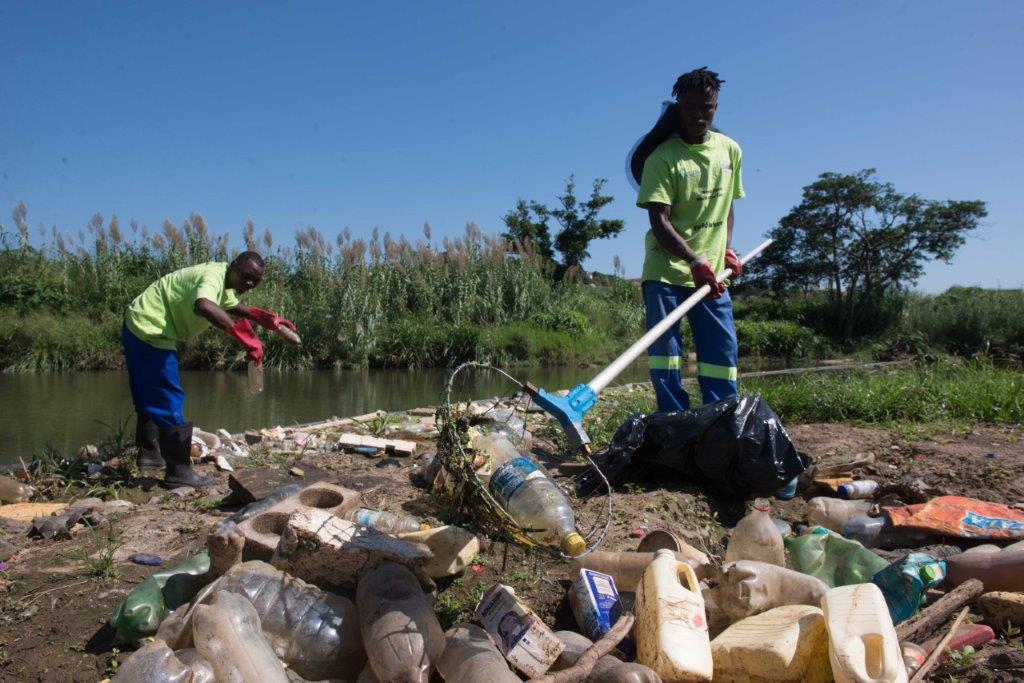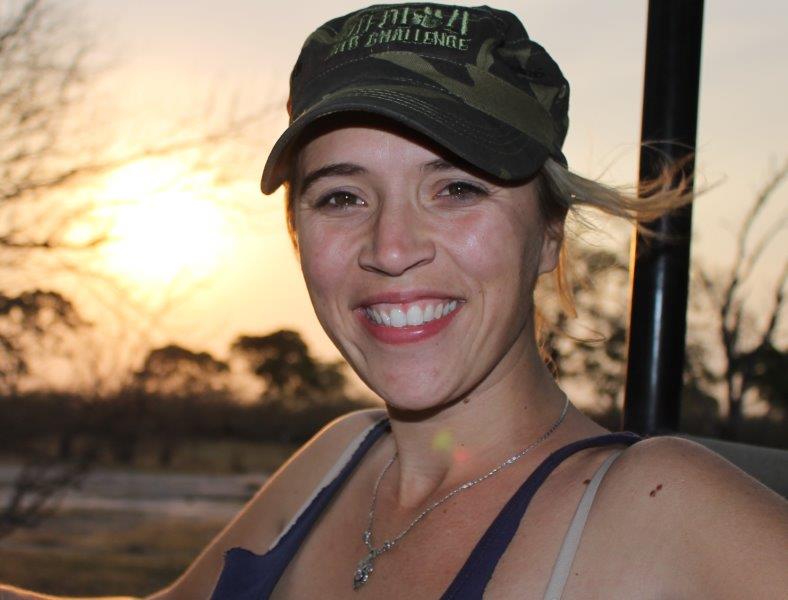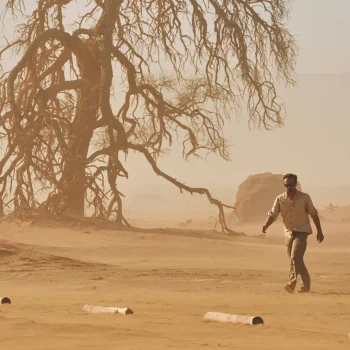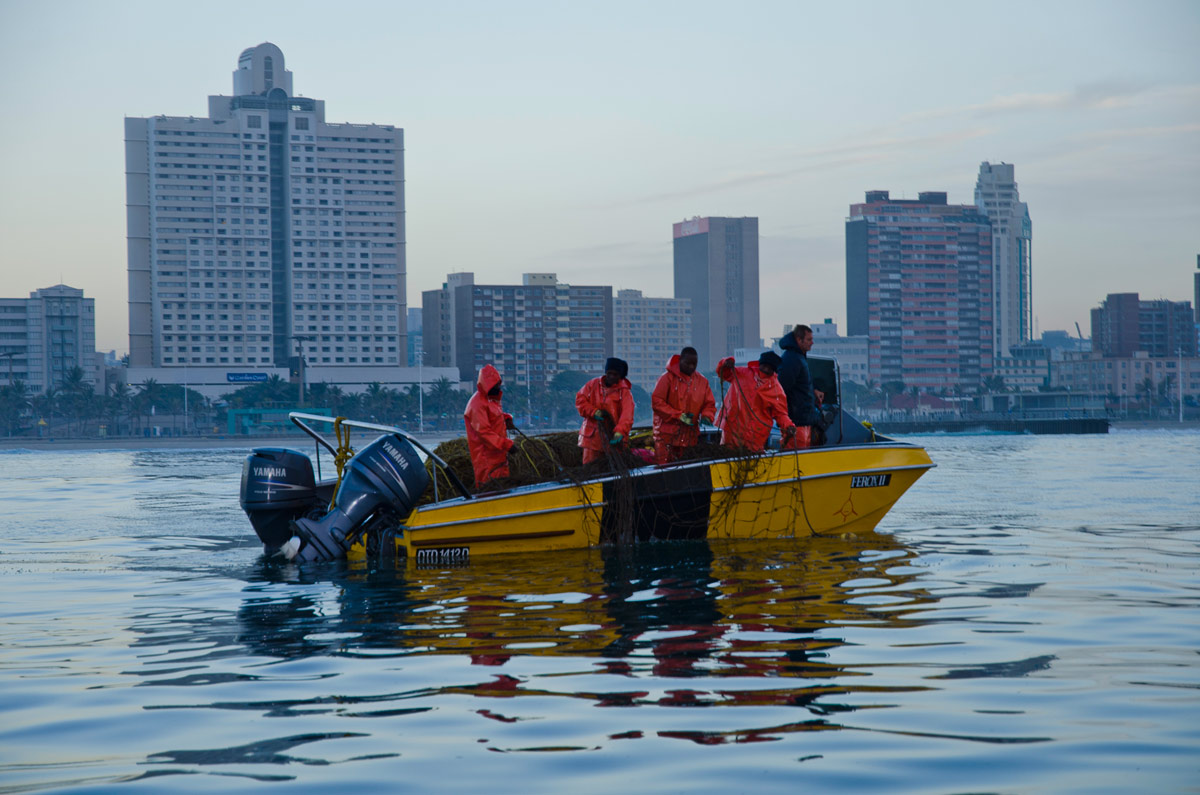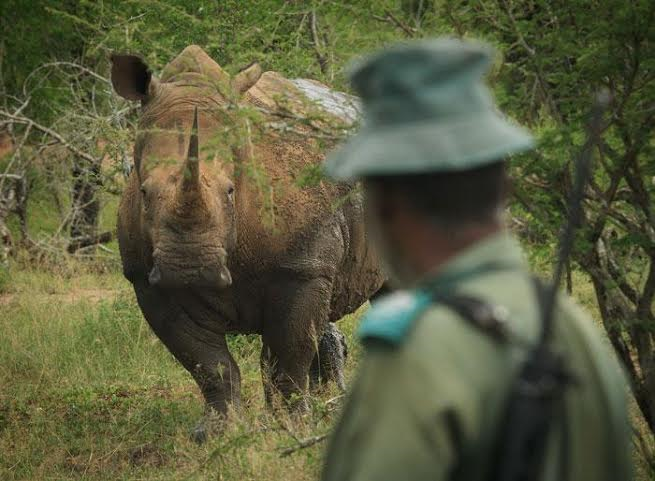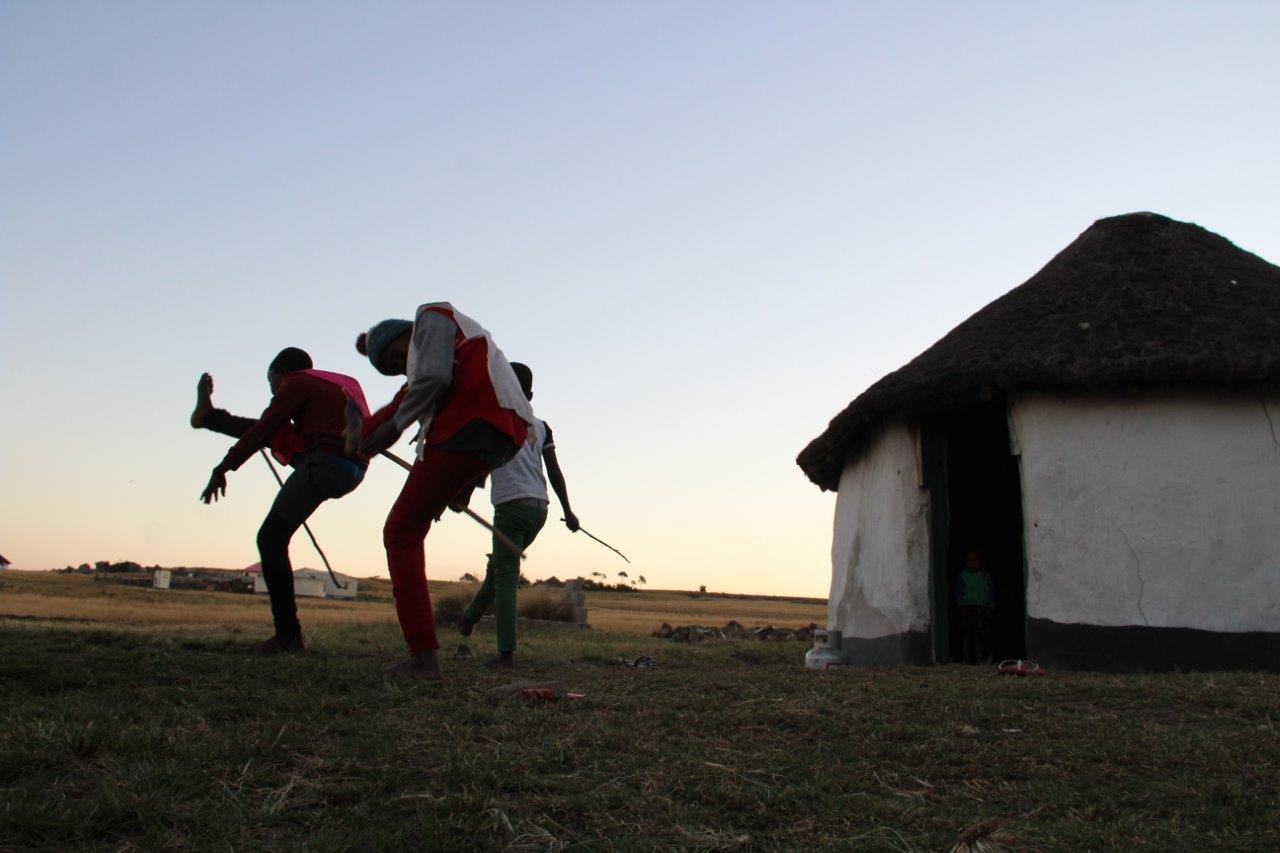Unrecyclable plastic waste collected from the Umgeni River could soon become part of paving networks, walkways and eco-landscapes in and around Durban, write Jared Sumar and Fred Kockott.
This is one of several innovations from Green Corridors – a non-profit social-purpose organisation and incubator of various environmental initiatives.
Green Corridors already has in place effective waste collecting litter booms along various tributaries of the Umgeni River, stretching from just above the Blue Lagoon area and into various informal settlement areas.
Originally designed by Bart Fokkens, formerly from the Dusi-Umgeni Conservancy Trust, the litter booms help stop tons of plastic waste and other trash ending up in the ocean every month.
Dirty waste
But much of this waste is not recyclable. So, a Green Corridors team now plans to mix the ‘dirty plastic waste’ with waste glass to create durable “plastic ocean” pavers for walkways and landscaping.
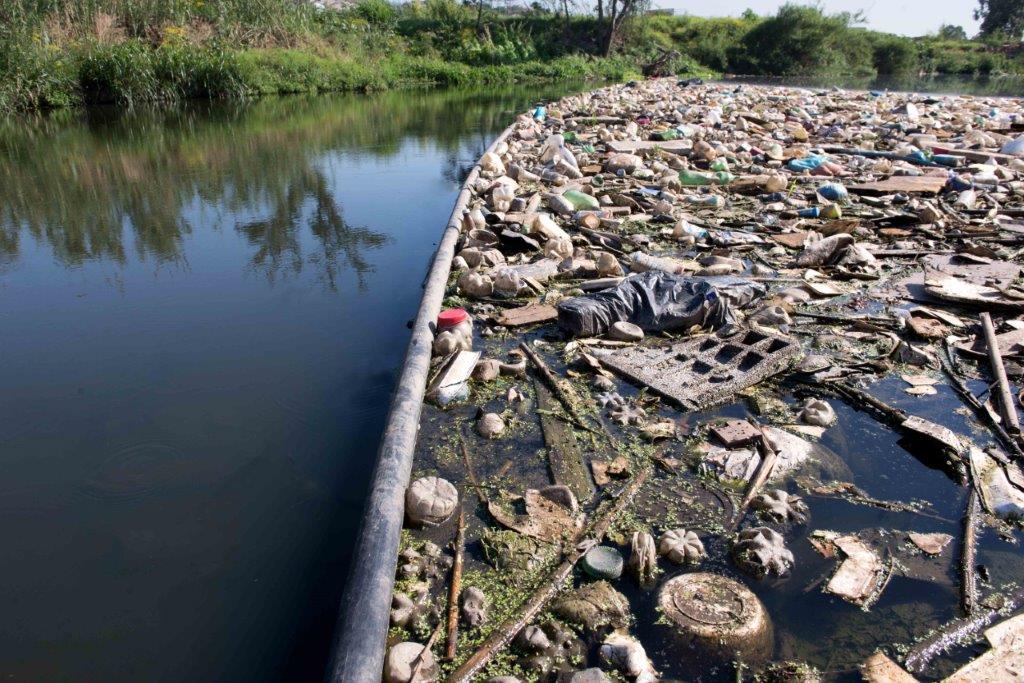
After heavy rains, plastic waste and other litter washes down the rivers into the sea. The innovative litter booms manage to stop a lot of waste, but more is needed to educate people on not throwing litter down storm water drains, and into waterways which ultimately reach the sea. Photo: Val Adamson
The initiative is lead by Jonathan Welch, a project manager at Green Corridors’ new Waste Beneficiation Centre in KwaMashu.
“All of the work do is driven by how we use natural or man-made or waste to benefit the community and the environment,” said Welch. “Our tests, spearheaded by engineers and other specialists, have proven extremely viable.”
“We are confident that this will be a successful pilot programme to set up in communities around Durban, creating a funnel for waste and revenue streams, and jobs for the communities,” added Walsh.
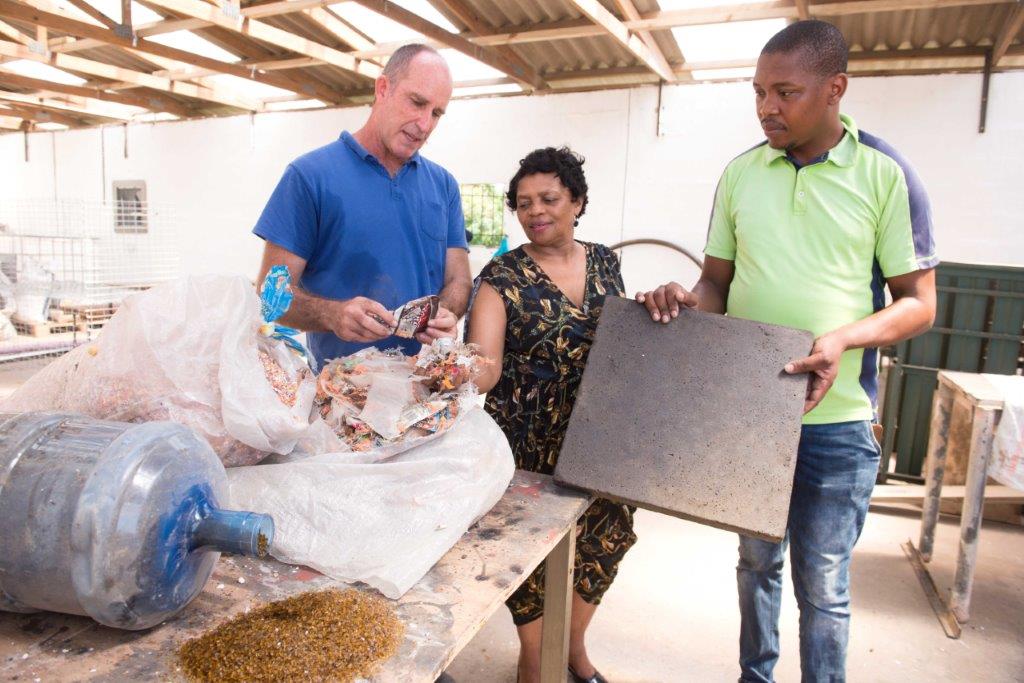
Project Manager of the Green Corridors Beneficiation Centre in KwaMashu Jonathan Welch (left) and Centre Manager Muzi Masuku (right) show Ward 44 Councillor Lindiwe Ncayiyana how the “ocean pavers’ are made from glass and plastic waste. Photo: Val Adamsom
Welch and his team also wants to harvest fibre from alien plants and treat and mix it with concrete to create other kinds of paving blocks.
The centre is currently showcasing the capacity to use concrete building rubble in gabions – welded wire cages that are normally filled with “virgin” stones and used for slope stability and erosion protection in construction.
Grass and cutting waste from the City’s parks department will also be deposited at the centre to create compost, and used to help green various sites in the city.
Impact-focused
Local guide and Green Team coordinator, Siphiwe Rakgabale, said these impact-focused projects were all about exploring a synergistic approach – “where one hand washes the other” – in creating a greener and more sustainable future.
He said on average every month more than one to two tonnes of plastic waste was collected from three litter booms alone in and around Umgeni River.
Spill-overs
But during heavy rains, the litter booms filled up with too much waste, resulting in spill overs.
So Rakgabale wants to enhance their collection capacity by filling up two litre plastic bottles with waste and attaching them to top of the litter booms to form an elevated barrier.
He said if the idea works, the extra time given to clean each boom could allow Green Corridors to expand from the six current litter booms, and add more to other Durban rivers.
-
This story was first published by Sunday Tribune
>> Also read: Green Corridors enable people to explore the curative nature of the outdoors
- Jared Sumar is a Goucher College sociology student enrolled on Roving Reporters training project, Developing Environmental Watchdogs. The programme is directed by veteran journalist and founder of Roving Reporters, Fred Kockott
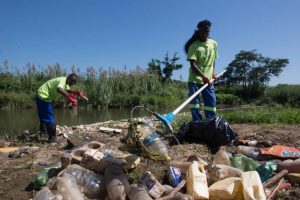
BANNER IMAGE: Jabulani Ngwenya and Sifiso Luvuno – Green Team community members from Johanna Road clear the waste from the litter boom on an Umgeni River tributary. Photo: Val Adamson

Journalists are trained to answer six key questions: Who, What, Where, When Why, and How. >> Click here to read about the 5 W’s and H of Roving Reporters.
Difficult choices must be made about how we utilise natural resources. But these choices need to be well informed if we are to do the least harm.
This requires citizens have a clear picture of what is happening on the ground. There are too many vested interests at play to leave things entirely to officials, elected or otherwise.
Keeping people in office on their toes and holding powerful interests, including NGOs, to account is an important role of the press.
Unfortunately, the media’s ability to do its job in South Africa has been hollowed away by the decline of traditional advertising support and readerships in the face of online technology.
Some papers have closed down, others are a pale shadow of their former selves; everywhere staff are stretched or juniorised.
Press standards have declined and false news abounds. Barring a few exceptions, reporting in the mainstream media is increasingly superficial. Yet a strong appetite remains for credible news and insights, especially on environmental matters.
This underlines the need for Roving Reporters to grow its operations and develop a sustainable platform for environmental journalism training in Southern Africa supported by key stakeholders.
You can support our training progamme, Developing Enviromental Watchdogs by making a donation, no matter how small. Click here for further information.
If you have a story you would like Roving Reporters to cover, send a WhatsApp message to +27 83 277 8907, including contact details of people we should speak to in verifying the facts and conducting associated fieldwork and research. Your message should also answer the question: Why should we care?

